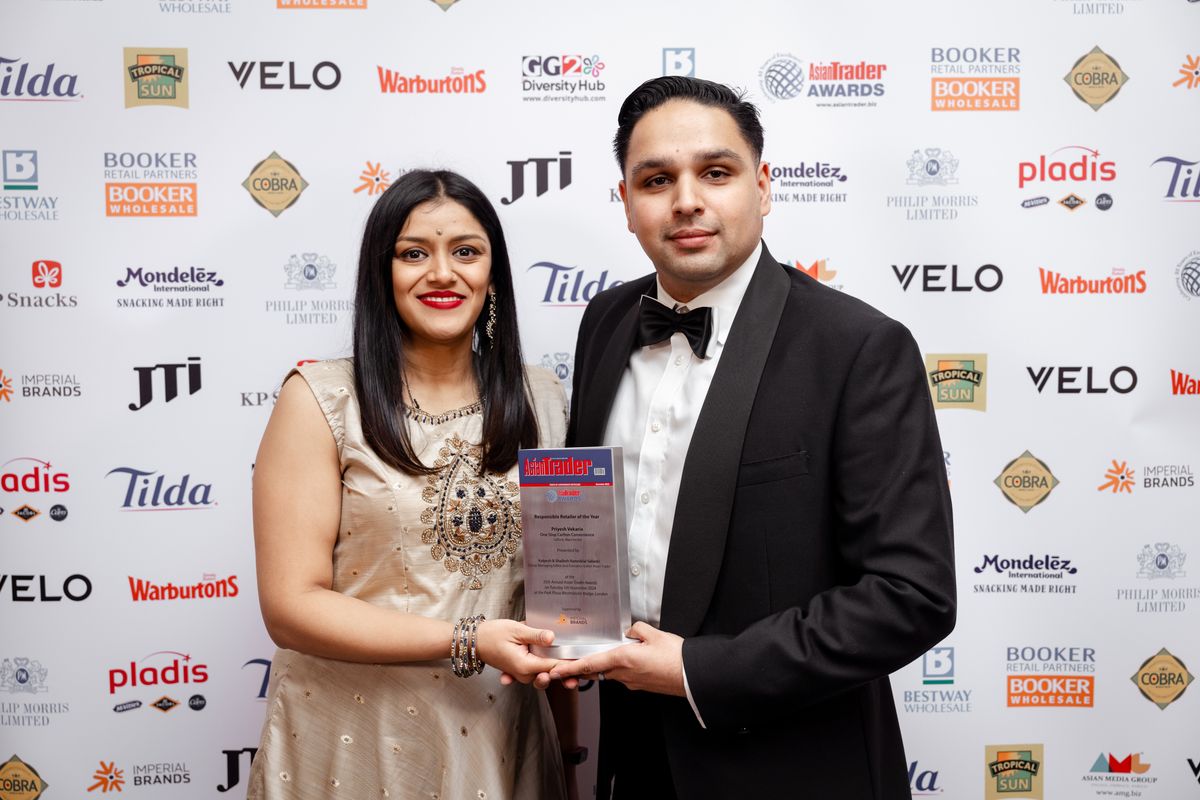The alert pierces through the gentle hum of the radio in Salford’s One Stop Carlton Convenience store.
“A shoplifting incident may just have occurred in this store, all team members to follow protocol and be advised.” Within five seconds of someone slipping a chocolate bar into their pocket, artificial intelligence has spotted the theft, sending video clips to every staff member's device.
But this isn't just another high-tech deterrent in the endless war against retail crime. It's part of a philosophy that has earned Priyesh Vekaria recognition as Responsible Retailer of the Year 2024 at the Asian Trader Awards.
A former police sergeant, Priyesh brings the insight of a decade spent in the force to every decision he makes as a retailer. But the pivotal chapter in his retail journey began with a simple drive home from work in 2013, newly married and searching for something more than his public sector career could offer.
“I was driving home one day, and I saw this building. It was an old pub, and I thought I could do something with that,” Priyesh recalls. That dilapidated pub would become the foundation not just for a thriving business, but for a revolutionary approach to convenience retailing that puts community welfare at its heart.
The unexpected path
The journey to that moment began when his parents arrived in the UK as migrants in the 1990s – his father from East Africa, his mother born in India. They settled briefly in London before his father spotted opportunities in retailing and embraced it as the family’s new beginning in Britain.
The family’s first store, the Go Local Duchy Stores in Salford, became the bedrock of their livelihood and the place where Priyesh and his brother Amit (featured in this issue’s Retail Corner) grew up, absorbing the rhythms of community commerce.
“That was where the foundations were laid in our minds that it was a fallback option for us,” Priyesh explains. “Initially, we were asked to complete our further education and try and find professional work, and if we couldn't find anything that we enjoyed or that made us comfortable and steady, then that was an option for us.”
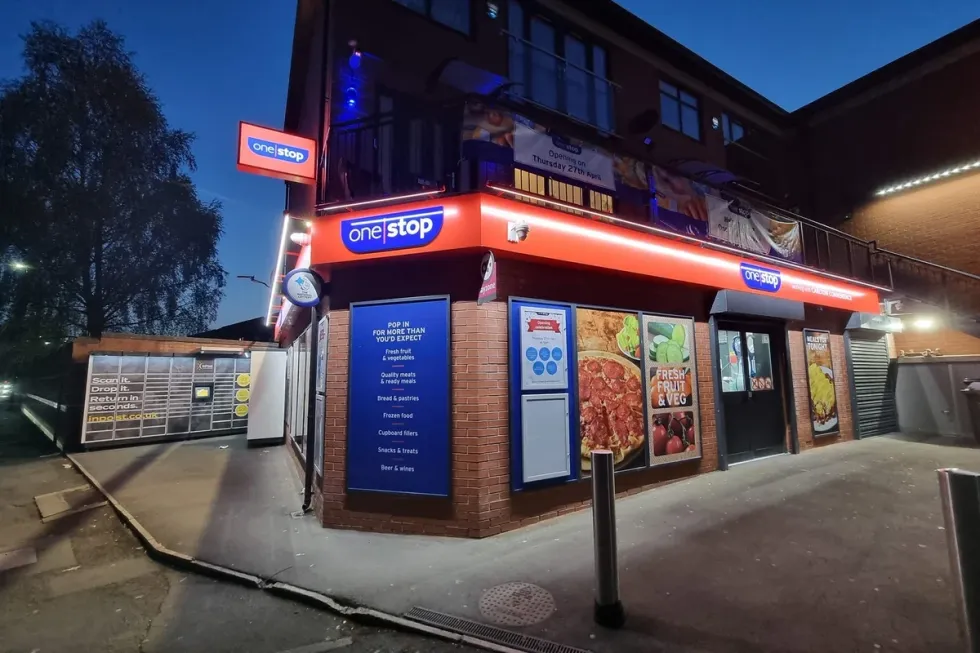
The professional route seemed promising. Priyesh qualified in criminal justice, practised personal injury law for seven months, and simultaneously built a career in policing that would span a decade across three constabularies – Leicestershire, Cheshire, and Greater Manchester. Rising to the rank of sergeant, he managed teams of 30 officers, gaining what he calls “an insight into the psychology of the individuals that we serve in the community.”
By 2013, Priyesh found himself questioning his path. The realisation that he needed “to do something that's now going to feed me and my family, not benefit a supervisor or a line manager or someone else's business” was crystallising. Then came that fateful drive past the old pub, followed by a conversation with his father that would reshape his understanding of what business could be.
“My dad said to me, 'Priyesh, you're not doing anything that's going to give you a comfortable lifestyle, or going to give you savings in the long term. Why don't you go into business, do something?'”
Building from ruins
What followed was a masterclass in vision over immediate reality. The pub wasn't just run-down – professional surveys revealed fire damage and structural problems that made restoration impossible. Rather than retreat, Priyesh and his father went to the drawing board, securing bank backing for an ambitious reconstruction: demolishing the entire building and creating a ground-floor commercial unit with two flats above and four three-storey townhouses.
The property portfolio was impressive, but the real challenge lay in understanding how to serve the community that would sustain it. “I hadn't really quite grasped how I was going to deliver convenience retail to this community that I'm currently serving,” Priyesh reflects. “So, it was a lot of understanding the community's needs, the wants, the demographics, the dynamics.”
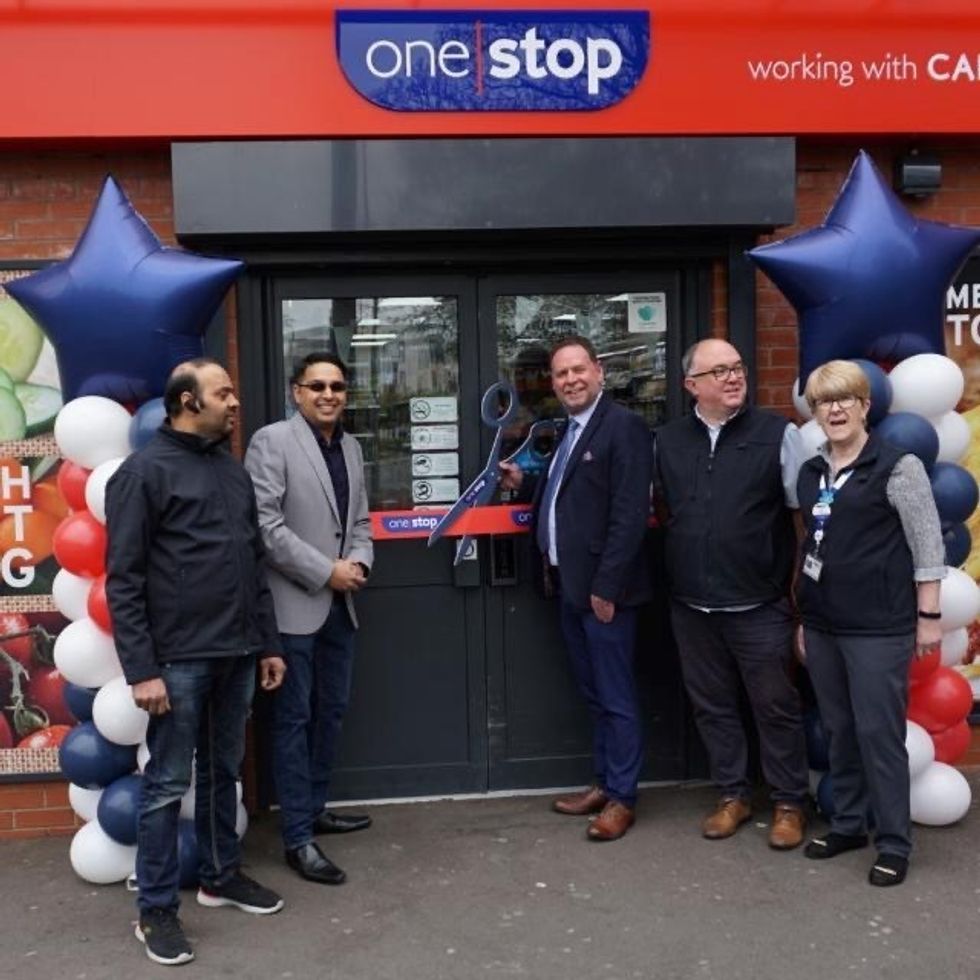
This learning curve led through partnerships with symbol groups Select and Save, then Go Local Extra, before the breakthrough decision in 2022 to franchise with One Stop. The results speak volumes: weekly turnover jumped from £17,000 to £28-29,000, with an additional £5-6,000 from online services.
But the numbers only tell part of the story. What truly sets One Stop Carlton Convenience apart is what Priyesh calls his Dynamic Risk Assessment approach – a system borrowed from his police training and adapted for retail that goes far beyond checking IDs for age-restricted products.
The heart of responsibility
“Dynamic Risk Assessment is something that is a skill that we picked up and a training process that we were taught through the police force,” Priyesh explains. In policing, it's called the national decision-making model, designed to help officers justify and rationalise important decisions. In retail, it becomes something more profound: a framework for genuinely caring for customers as human beings.
The system starts with a core value: preventing age-restrictive products from falling into the hands of minors. But it extends far beyond checking dates of birth. “They may be of age, but do they have the mental capacity to buy this product, and is it safe for them to do so? Are they already under the influence of something, and should we be the ones that intervene?”
When a customer is refused a sale, the process doesn't end with rejection. Staff offer alternatives, provide support resources, even signpost customers to social services when needed. Most remarkably, they follow up. “After some time, we will reach out to them. We'll have that conversation, or if they come in again and we can see that they're in a better place, or they're still struggling, we'll ask them.”
This approach recently helped resolve what could have been a domestic abuse situation. Without revealing too many details, Priyesh describes how his team guided someone to recognise unhealthy relationship dynamics, leading both parties to return and thank the store for helping them understand their impact on each other.
“You know, we have particular behaviour mannerisms in our family homes, and we think we know that we're doing something for the best for our family members, but actually we're putting them in a difficult position where they feel like they're trapped,” he reflects.
Fighting the system
This community-first approach makes Priyesh's frustration with current enforcement systems all the more acute. The £200 shoplifting threshold – which designates theft under that value as a summary offence – has, in his view, created a monster that threatens the very foundations of community retail.
“Government, some years back, almost legalised shoplifting,” he states bluntly. “What they've done is, they've taken away our management tools.”
The impact goes beyond lost inventory. “When you steal from me, you're stealing from the community because I'm feeding the homeless. I'm also paying into the football team that your child supports and goes to. I'm paying into the dance group that your child goes to. I'm supporting local school for breakfast club that your children also go to.”
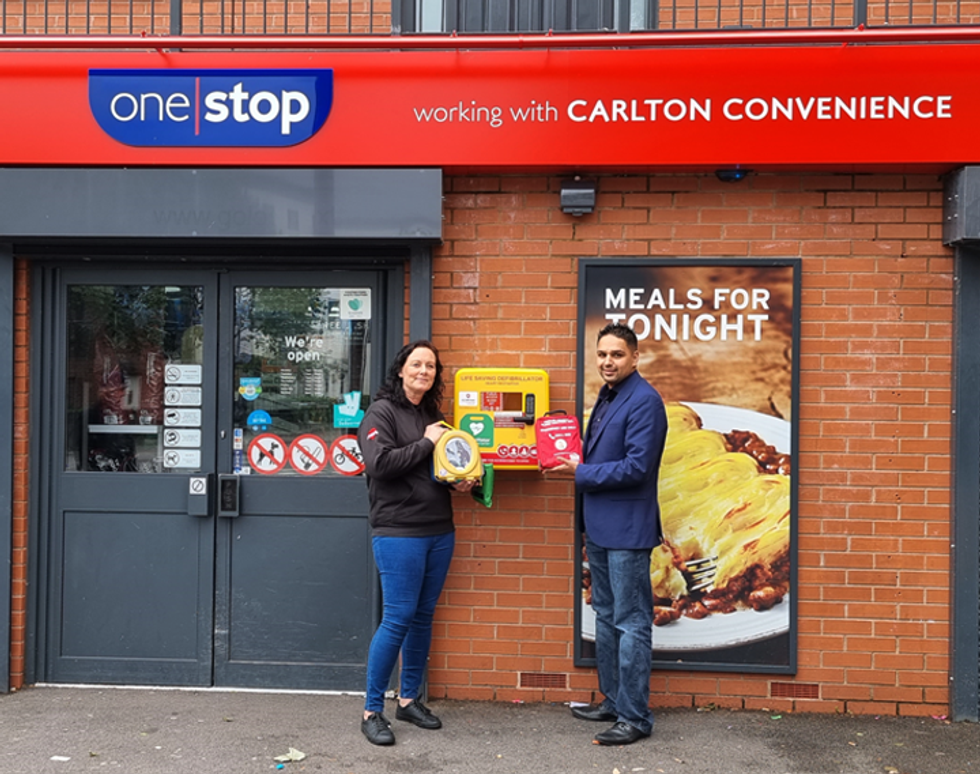
His store services a food bank twice weekly and supports Manchester's Homeless Aid every Tuesday and Thursday, regardless of circumstances. These community investments become casualties of theft that enforcement agencies seem unable or unwilling to address meaningfully.
The AI-powered camera system represents Priyesh's technological response to policy failures, but it's the human response that reveals his character. Recent BBC interviews have highlighted his criticism of enforcement agencies' approach, particularly after a heavy-handed police raid on his store that treated his community-supporting team like suspects.
“I know that, having been an officer, if an allegation is made, you must go and deal with it. So do a compliance visit, but don't go and raid a store in that heavy handed format, because all that's done is that's made my team, who are doing everything they can to support that community, feel like they're suspects,” he argues.
Innovation through care
Perhaps most remarkably, Priyesh has created what he calls a graduate sponsorship scheme, bringing talented individuals from India to work in his store while supporting their families' migration to the UK. It's an approach born from practical experience rather than ideology.
“Having trialled multiple local individuals for these roles, I just couldn't get them to have the same effort. The work ethic was different, the understanding of the relationship just wasn't the same,” he explains.
The sponsored employees joined in 2023, and by year's end, Priyesh was supporting their dependents' immigration, creating not just jobs but genuine opportunities for families to build new lives.
“It's a very proud model to share, because what you're doing is you're offering opportunities to individuals from all over the world who have talent,” he notes.
Core is More
Looking ahead, Priyesh's philosophy centres on what he calls “core is more” – focusing on fundamental excellence rather than endless expansion. “You don't look to have the biggest range of products in your store. You focus on the core products that need to be sold through convenience store providing the best value to your consumer.”
This approach extends to partnerships, where One Stop Carlton Convenience has influenced product launches across the Tesco family of companies. A successful Evian water relaunch, mediated by Priyesh between One Stop and Danone, demonstrates how independent retailers can drive category growth across major retail chains.
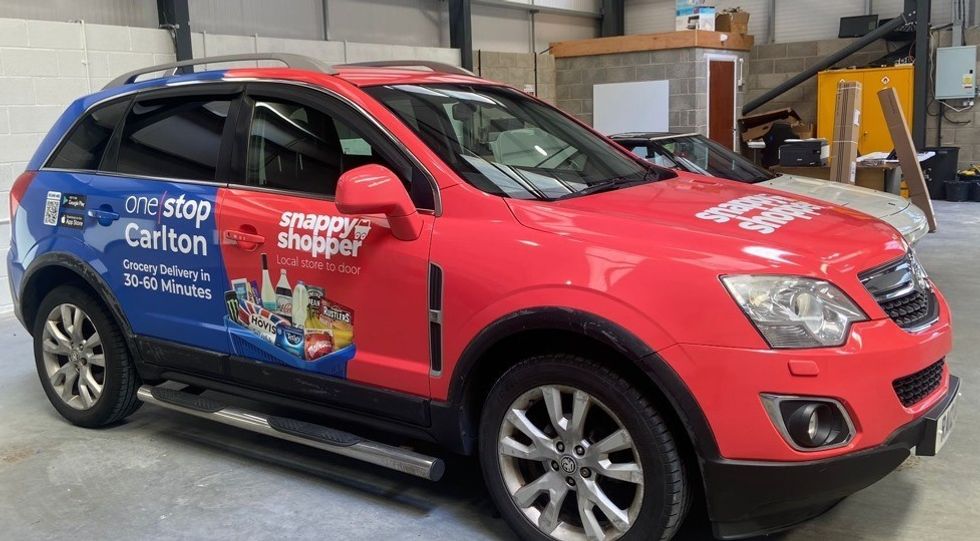
“If I've introduced something new, Booker introduces it, then it also lands in Tesco. We're all pushing the same product. We're all shifting huge volumes, and everybody wins,” he explains.
For young retailers entering the industry, his advice is clear: choose the right commercial partner, embrace innovation, but never lose sight of community responsibility. “Community responsibility is definitely the big one,” he emphasises. “But also, when a young retailer is coming into the industry, they want something that's innovative, exciting and new, and if they have concepts and ideas, they need to make sure to choose the right trade partner.”
Having worked with both symbol group and franchise partnership models, he believes franchise is the way forward, “because it’s a tried and tested, structured model.”
The bigger picture
Standing in his store, watching the AI cameras monitor shelves while his sponsored employees serve customers who increasingly see the shop as a safe space to share their troubles and celebrations, Priyesh embodies a new model of responsible retailing. It's one that combines cutting-edge technology with old-fashioned human care, police-trained risk assessment with genuine community investment.
His criticism of enforcement agencies stems not from a desire to avoid responsibility, but from frustration at systems that penalise the compliant while ignoring the problematic. His Dynamic Risk Assessment approach represents not just good business practice, but a blueprint for how retailers can genuinely serve their communities' welfare.
“Being a community first retailer, it's really important that we understand it's our responsibility to ensure the welfare of that community,” he concludes. “If we do not ensure the welfare of that community is looked after, we're in servitude to that community, and without that community, our business does not exist.”

